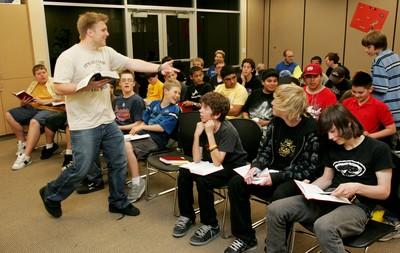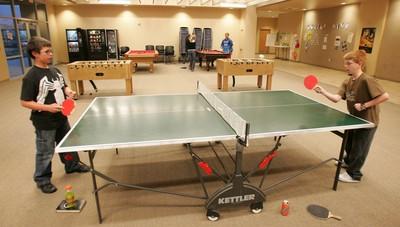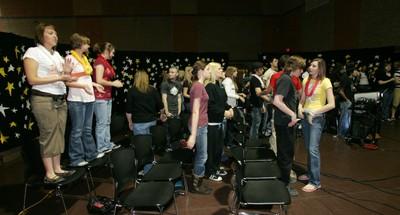FAITH IN THE FUTURE



The recreation center at Shadow Hills Baptist Church is a whirlwind of adolescent activity.
Kids skateboard outside, hurriedly disembark from SUVs driven by their parents and loiter inside the building, talking, punching text messages into cell-phone keypads, playing table tennis.
Then, at a few minutes before 7 p.m., the kids hurry into the adjacent gymnasium or nearby classrooms for worship or Bible study classes.
But here’s the weird part: Many of the 175 or youths who participate in these Wednesday evening programs aren’t members of the church, says Shari Hall, junior high youth minister at Shadow Hills.
“We’ve actually had several parents lately (who) have brought their teenagers to our church, saying, ‘My friends come here and we go to another church, but I’ve heard some awesome things about your youth ministry and I want my kids to be involved,’ ” Hall says.
Some parents drop their kids off at Shadow Hills then head off to progams at their own churches, and some of the participants belong to no church at all.
But all are welcome at the programs, which are a key part of Shadow Hills’ youth ministry efforts and an example of how the business of bringing the Gospel to kids has changed over the past few decades.
Today, church leaders recognize that youth ministry programs aren’t just a way to keep kids busy while the adults do whatever it is they do. The programs can strengthen young people’s faith to cope with a world that offers many competing messages. They also can foster a sense of Christian service in a population that has passion and energy to spare.
More importantly for mainline Christian denominations that are experiencing stagnant or declining membership, an effective youth ministry program can be critical in creating another generation of churchgoers.
While some churches had an early start reaching out to young people — Southern Baptists had paid workers who worked with kids in the late 1800s — many churches did not recognize a gap until the 1960s, according to Chapman R. Clark, professor of youth, family and culture at Fuller Theological Seminary in Pasadena, Calif.
“Churches started to see the need to give kids something more for them — something more sociologically friendly, more adaptable to their music and their tastes,” says Clark, and, by the late 1980s, youth ministry had become a specific ministerial discipline.
For youth ministers, finding ways to connect with young people is key. Today that means multimedia, says Clayton Payne, director of youth ministries and discipleship at Desert Spring United Methodist Church. Music, graphics, computers, movies and DVDs are commonplace.
“You’re not running Windows 98 on your computer, you’re running Vista. Why not change? Media is very much a tool we use.”
Yet, even in a high-tech world, young people crave real relationships, says Fred Olinger, director of youth and family ministry at Community Lutheran Church.
“The Xbox and GameBoy and Wiis and PlayStation cannot have a conversation with kids,” he says.
Nor does youth ministry happen only on Sunday mornings. Instead, Olinger says, it’s about ministering to young people on their own turf and at whatever time works. Before- and after-service chats are routine, as are discussion sessions and interactions, both informal and formal, throughout the week.
By building relationships, youth ministers show young people that “we don’t see them as an afterthought,” Olinger says. “As youth ministers, we let kids know they are not invisible. I think it’s important that kids need to know they are lovable, capable and forgivable.”
Shadow Hills Baptist Church’s Wednesday evening gatherings are a way for church staffers and youth to interact in a venue that’s low-key and low-pressure. During the evening, kids have free time to socialize and also participate in discussions, worship and Bible study.
Hall says some young people come to Shadow Hills’ youth events “because they want to hang out with their friends.”
But, she adds, “we’ve also seen a lot of neighborhood kids who have come to know the Lord because they come here.”
In addition, youth ministers at Shadow Ridge build relationships with kids via activities such as distributing Bibles door-to-door in the neighborhood, assisting at vacation Bible school and other church activities, and helping to build a church kitchen while on a mission trip to Mexico.
“My whole perspective is to try to teach them that it’s not about them,” Hall says, but, “that we are here to serve other people and we are here to show God’s love to other people.”
Youth ministry also offers a venue for teaching young people Christian leadership skills that will serve them not only in their churches, but at school, in the home and in the community. This year, for example, 33 young members of Community Lutheran Church will participate in a leadership training conference in Illinois.
Such activities expand the notion of youth ministry beyond its stereotypical role as a social outlet for a congregation’s kids. “If we don’t bring the message of the Gospel to the world, we’re just another social activity group,” Olinger says.
Above all, he adds, youth ministry is a way to “bring Jesus Christ (to young people), to instruct them, to nurture them in the faith, and to pass on the faith to the next generation.”


















